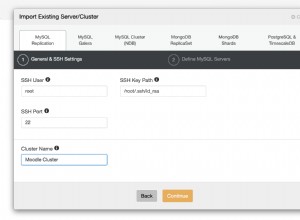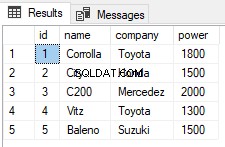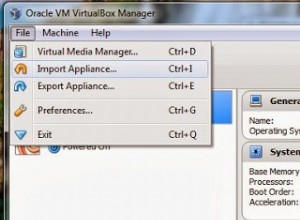Mise à jour du 5 décembre 2011
Grâce à Brad Robertson et son équipe, il y a le Joyau de l'appartement . C'est très utile et fait beaucoup de gros travaux.
Cependant, si vous allez bricoler avec des schémas, je vous suggère fortement de savoir comment cela fonctionne réellement. Familiarisez-vous avec la procédure pas à pas de Jerod Santo , vous saurez ainsi ce que fait plus ou moins la gemme Appartement.
Mise à jour du 20 août 2011 à 11h23 GMT+8
Quelqu'un a créé un article de blog et suit assez bien tout ce processus.
Mise à jour du 11 mai 2010 à 11h26 GMT+8
Depuis hier soir, j'ai pu faire fonctionner une méthode qui crée un nouveau schéma et y charge schema.rb. Je ne sais pas si ce que je fais est correct (semble bien fonctionner, jusqu'à présent), mais c'est au moins un pas de plus. S'il existe un meilleur moyen, faites-le moi savoir.
module SchemaUtils
def self.add_schema_to_path(schema)
conn = ActiveRecord::Base.connection
conn.execute "SET search_path TO #{schema}, #{conn.schema_search_path}"
end
def self.reset_search_path
conn = ActiveRecord::Base.connection
conn.execute "SET search_path TO #{conn.schema_search_path}"
end
def self.create_and_migrate_schema(schema_name)
conn = ActiveRecord::Base.connection
schemas = conn.select_values("select * from pg_namespace where nspname != 'information_schema' AND nspname NOT LIKE 'pg%'")
if schemas.include?(schema_name)
tables = conn.tables
Rails.logger.info "#{schema_name} exists already with these tables #{tables.inspect}"
else
Rails.logger.info "About to create #{schema_name}"
conn.execute "create schema #{schema_name}"
end
# Save the old search path so we can set it back at the end of this method
old_search_path = conn.schema_search_path
# Tried to set the search path like in the methods above (from Guy Naor)
# [METHOD 1]: conn.execute "SET search_path TO #{schema_name}"
# But the connection itself seems to remember the old search path.
# When Rails executes a schema it first asks if the table it will load in already exists and if :force => true.
# If both true, it will drop the table and then load it.
# The problem is that in the METHOD 1 way of setting things, ActiveRecord::Base.connection.schema_search_path still returns $user,public.
# That means that when Rails tries to load the schema, and asks if the tables exist, it searches for these tables in the public schema.
# See line 655 in Rails 2.3.5 activerecord/lib/active_record/connection_adapters/postgresql_adapter.rb
# That's why I kept running into this error of the table existing when it didn't (in the newly created schema).
# If used this way [METHOD 2], it works. ActiveRecord::Base.connection.schema_search_path returns the string we pass it.
conn.schema_search_path = schema_name
# Directly from databases.rake.
# In Rails 2.3.5 databases.rake can be found in railties/lib/tasks/databases.rake
file = "#{Rails.root}/db/schema.rb"
if File.exists?(file)
Rails.logger.info "About to load the schema #{file}"
load(file)
else
abort %{#{file} doesn't exist yet. It's possible that you just ran a migration!}
end
Rails.logger.info "About to set search path back to #{old_search_path}."
conn.schema_search_path = old_search_path
end
end




